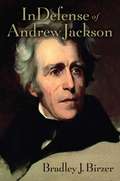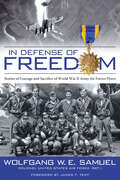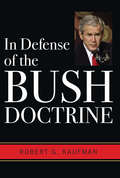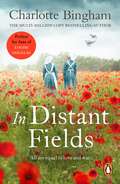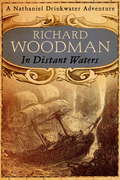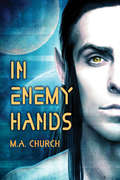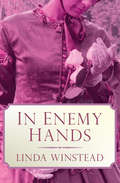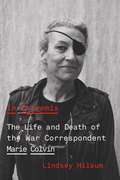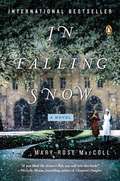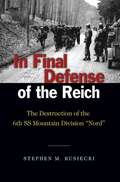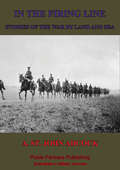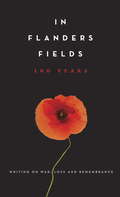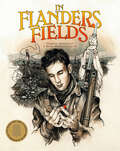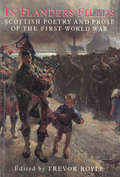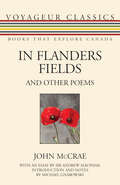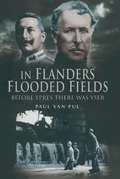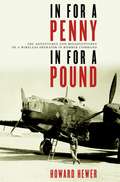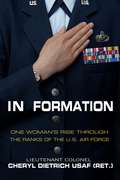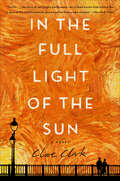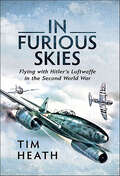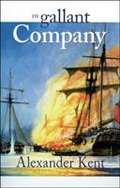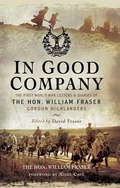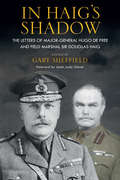- Table View
- List View
In Defense of Andrew Jackson
by Bradley Birzer“I’m not an Andrew Jackson fan, but I’m definitely a Bradley Birzer fan. His case for Old Hickory is as strong as any I’ve seen and deserves to be reckoned with.”- THOMAS E. WOODS JR., author of The Politically Incorrect Guide to American History. “Most discussion of Andrew Jackson falls into predictable ruts, defaulting automatically to clichés that reflect more on our own time than his. Whether America is entering another ‘Jacksonian’ period depends upon understanding the first one more clearly, and we have Bradley Birzer to thank for taking up a spirited defense of this complicated man and his legacy.” - STEVEN F. HAYWARD, author of The Age of Reagan: The Conservative Counterrevolution 1980-1989. “Liberal revisionists have pounded Andrew Jackson down to the point where Democrats are ashamed to admit he founded their party. In Defense of Andrew Jackson sets the record straight on America’s first populist president.” - JAMES S. ROBBINS, author of Erasing America: Losing Our Future by Destroying Our Past. “As a man and a military hero, Andrew Jackson is as American as they come. But in this timely biography, Bradley Birzer has managed to peel back layers of cliché and reveal our seventh president as a more complex human being than current textbooks allow.” - GLEAVES WHITNEY, director of Grand Valley State University’s Hauenstein Center for Presidential Studies. "He was a man of the frontier, self-made but appreciative of those who gave him their loyalty and support. He was, pure and simple, and American..." He was controversial in his time—and even more controversial in our own. Indian fighter, ardent patriot, hero of the War of 1812, the very embodiment of America’s democratic and frontier spirit, Andrew Jackson was an iconic figure. Today, Jackson is criticized and reviled – condemned as a slave-owner, repudiated as the president who dispatched the Indians down the “Trail of Tears,” dropped with embarrassment by the Democratic Party, and demanded by many to be removed from the twenty-dollar bill. Who is the real Andrew Jackson? The beloved Old Hickory whom Americans once revered? Or the villain who has become a prime target of the Social Justice Warriors? Using letters, diaries, newspaper columns, and notes, historian Bradley Birzer provides a fresh and enlightening perspective on Jackson —unvarnished, true to history, revealing why President Donald Trump sees Andrew Jackson as a political role model, and illustrating the strong parallels between the anxieties of Jacksonian America and the anxieties of the "Hillbilly Elegy" voting bloc of today. In this brilliant new book, Bradley Birzer makes the case that Jackson was… The epitome of the American frontier republican. Passionately devoted to individual liberty. A staunch proponent of Christian morality. Not only dedicated but also vital to the preservation of the Union. A significant and influential role model to President Donald J. Trump. In Defense of Andrew Jackson sets the record straight on our seventh president, revealing a radically new but historically accurate perspective on Jackson.
In Defense of Freedom: Stories of Courage and Sacrifice of World War II Army Air Forces Flyers
by Colonel Wolfgang W. SamuelThe twenty-seven stories in this book serve as a graphic reminder of the selfless heroism of America's World War II Army Air Forces flyers and how necessary they were to achieve Allied victory. Wolfgang Samuel and the pilots he interviewed reveal the peril these men faced to achieve a daunting task, impossible without their bravery. And their sacrifices were stunning—American bomber crews suffered the highest casualties (KIA, MIA, POW, wounded) of all American armed services in World War II. The stories preserved in this book bear that grave danger out. A member of a heavy bomber crew in the 8th Air Force in the period from mid-1942 to spring 1944 was less likely to survive than a US Marine fighting on Iwo Jima or Okinawa. The stories in this unique book are about men who went face to face with their adversaries, who saw their buddies die, who crashed planes, and who became prisoners of war. Many later went on to become the backbone of the postwar Air Force, serving in Korea and Vietnam and during the Cold War. Young Ken Chilstrom led a flight of eight A-36 fighter bombers on a low-level foray in Italy. Only he and two others came home. Bob Hoover thought he could take on the entire German air force, but on his first mission he was shot down, nearly perished, and suffered the remainder of the war in a prisoner-of-war camp. Wolfgang Samuel's new book is all about men like Ken, Bob, and the many friends they lost, who saw World War II through to the end and gave freedom to so many others.
In Defense of Internment: The Case for 'Racial Profiling' in World War II and the War on Terror
by Michelle MalkinIn Defense of Internment
In Defense of Japan: From the Market to the Military in Space Policy
by Saadia M. Pekkanen Paul Kallender-UmezuIn Defense of Japan provides the first complete, up-to-date, English-language account of the history, politics, and policy of Japan's strategic space development. The dual-use nature of space technologies, meaning that they cut across both market and military applications, has had two important consequences for Japan. First, Japan has developed space technologies for the market in its civilian space program that have yet to be commercially competitive. Second, faced with rising geopolitical uncertainties and in the interest of their own economics, the makers of such technologies have been critical players in the shift from the market to the military in Japan's space capabilities and policy. This book shows how the sum total of market-to-military moves across space launch vehicles, satellites and spacecraft, and emerging related technologies, already mark Japan as an advanced military space power.
In Defense of the Bush Doctrine
by Robert G. KaufmanA foreign policy expert “presents a thoughtful, comprehensive case” for the War on Terror—a “historically powerful support of Mr. Bush and his doctrine” (Washington Times).The terrorist attacks of September 11, 2001, shattered the tranquil and prosperous optimism that had blossomed in the United States during the 1990s. President George W. Bush responded with a preemptive Global War on Terror. This controversial strategy led the nation into protracted conflicts in Iraq and Afghanistan and ignited passionate debate about America’s role in the world.In Defense of the Bush Doctrine offers a vigorous argument for the principles of moral democratic realism that inspired the Bush administration's policy. Conservative columnist Robert G. Kaufman argues that the purpose of American foreign policy is to ensure the integrity and vitality of a free society and that America’s grand strategy must be guided by the cardinal virtue of prudence.Kaufman provides a broad historical context for America’s post-9/11 foreign policy, connecting the Bush Doctrine and other issues, such as how the United States should deal with China, to the deeper tradition of American diplomacy. Drawing from positive lessons as well as cautionary tales from the past, Kaufman concludes that moral democratic realism offers the most prudent framework for expanding the democratic zone of peace and minimizing threats to the United States.
In Distant Fields: a wonderful novel of friendship set in WW1 from bestselling author Charlotte Bingham
by Charlotte BinghamIn Distant Fields, by million copy and Sunday Times bestselling author Charlotte Bingham, is a wonderfully heart-wrenching and heart-warming novel of love, heartbreak and, most importantly of all, the remarkable nature of female friendship. Fans of Louise Douglas, Dinah Jefferies and Kristin Hannah will not be disappointed.'An engaging, romantic and nostalgic read' -- Daily Mail'A rip-roaring combination of high romance and breathless excitement' -- Mail on Sunday'As compelling as ever' -- Woman & Home'Just wonderful!' -- ***** Reader review'I found I couldn't put it down... FANTASTIC!!' -- ***** Reader review'There has been a lot written about the Great War, then and now - and this should join the list of must-be-read books. So forget WAR HORSE. This is the one.' -- ***** Reader review*****************************************************************************************ALL ARE EQUAL IN LOVE AND WAR...Christmas 1913: Kitty and Lady Partita are best friends despite vastly different backgrounds. Partita has invited her friend, Kitty, to stay at her ancestral home, Borders Castle.The grandeur of Partita's family seat is in stark contrast to Kitty's home in London where she and her mother, Violet, struggle to maintain appearances despite Kitty's father gambling away the family money.Kitty is introduced to the aristocracy - a fascinating, decorative and theatrical world - and is enthralled, desperately wanting to be part of this way of life.But war breaks out, not only irrevocably changing society, but also the lives of these two beautiful young women. The headstrong Partita and down-to-earth Kitty become nurses and selflessly care for the men horrifically injured in the trenches of WWI.Will world events put a strain on their friendship, or will the strength of their bond shine through?
In Distant Waters: Number 8 in series (Nathaniel Drinkwater #8)
by Richard WoodmanFrom the tide-torn waters of the Thames, where Captain Nathaniel Drinkwater is compelled to deal with a deserter, to the seas off stunning, traitorous Cape Horn - storm-scoured gateway to the Pacific - the great cruiser Patrician is tense with the threat of mutiny. Despite this, Drinkwater captures a Spanish frigate and meets the stunning Doña Ana Maria, daughter of the Commandante of San Francisco. But, having disturbed a hornet's nest of colonial intrigue, Drinkwater finds that the Spanish are eager to humiliate him and the Royal Navy. Moreover, a Russian battleship lurks somewhere offshore, pursuing Tsar Alexander's dark plans. Caught between two formidable enemies, Drinkwater must defeat enemies on all fronts if he is to survive - including on his own ship.
In Enemy Hands
by M. A. ChurchTwo very different civilizations--one bathed in bright sunlight and the other veiled in shadow. Bad decisions, declining resources, and a king on the brink of madness force Prince Varo Kutchif, third son of the royal family and a starship captain, to attempt the impossible: barter for Black Phospolrock, an energy source the mysterious Helkan Kingdom has in abundance. Varo opens a line of communication with Adlar, an intriguing Helkan who seems to reciprocate Varo's interest. He hopes so, because if negotiations collapse, Varo has orders to attack. The Helkans preside over a planet shrouded in perpetual darkness. Several species have tried to exploit its natural resources through trade with them, but all have failed. Adlar Mondur is the older brother to the Helkan ruler. An assassin of the highest order, he'll do anything to protect his king and his people--including tracking down the Yesri prince who crash-lands on their planet, leaving an ugly scar across its untouched beauty. Thus begins a journey where two men from disparate civilizations grow from enemies to lovers.
In Enemy Hands
by Linda Winstead JonesWhen handsome Quintin Tyler went into the Confederacy as an undercover Union spy, he thought that nothing--and no one--could undermine his Northern loyalty. When he met the beautiful and voluptuous Lily Radford, Quintin believed that Lily was just another lovely Southern Belle, not the scheming and brilliant strategist she had truly come to be. Now the two were star-crossed lovers--both deeply attached to the cause they fought for, but every day growing more deeply attached to each other....
In Extremis: The Life and Death of the War Correspondent Marie Colvin
by Lindsey HilsumBiography of the intrepid journalist Marie Colvin who was killed in an artillery attack in Homs, Syria, in 2012, at age fifty-six. With her death, the world lost a fearless and iconoclastic war correspondent who covered the most significant global calamities of her lifetime. This biography, written by her fellow reporter Lindsey Hilsum, is a thrilling investigation into Colvin's epic life and tragic death based on exclusive access to her intimate diaries from age thirteen to her death, interviews with people from every corner of her life, and impeccable research. After growing up in a middle-class Catholic family on Long Island, Colvin studied with the legendary journalist John Hersey at Yale, and eventually started working for The Sunday Times of London, where she gained a reputation for bravery and compassion as she told the stories of victims of the major conflicts of our time. She lost sight in one eye while in Sri Lanka covering the civil war, interviewed Gaddafi and Arafat many times, and repeatedly risked her life covering conflicts in Chechnya, East Timor, Kosovo, and the Middle East. Colvin lived her personal life in extremis, too: bold, driven, and complex, she was married twice, took many lovers, drank and smoked, and rejected society's expectations for women. Despite PTSD, she refused to give up reporting. Like her hero Martha Gellhorn, Colvin was committed to bearing witness to the horrifying truths of war, and to shining a light on the profound suffering of ordinary people caught in the midst of conflict.
In Falling Snow: A Novel
by Mary-Rose MaccollA vivid and compelling story of love, war and secrets, set against the backdrop of WWI France. 'In the beginning, it was the summers I remembered - long warm days under the palest blue skies, the cornflowers and forget-me-nots lining the road through the Lys forest, the buzz of insects going about their work, Violet telling me lies. ' Iris is getting old. A widow, her days are spent living quietly and worrying about her granddaughter, Grace, a headstrong young doctor. It's a small sort of life. But one day an invitation comes for Iris through the post to a reunion in France, where she served in a hospital during WWI. Determined to go, Iris is overcome by the memories of the past, when as a shy, naive young woman she followed her fifteen-year-old brother, Tom, to France in 1914 intending to bring him home. On her way to find Tom, Iris comes across the charismatic Miss Ivens, who is setting up a field hospital in the old abbey of Royaumont, north of Paris. Putting her fears aside, Iris decides to stay at Royaumont, and it is there that she truly comes of age, finding her capability and her strength, discovering her passion for medicine, making friends with the vivacious Violet and falling in love. But war is a brutal thing, and when the ultimate tragedy happens, there is a terrible price that Iris has to pay, a price that will echo down the generations. A moving and uplifting novel about the small, unsung acts of heroism of which love makes us capable.
In Final Defense of the Reich
by Stephen M. RusieckiIn April 1945 the American 71st Infantry Division exacted the final vestiges of life from the Reich's 6th SS Mountain Division in central Germany. On Easter weekend, the bypassed German division fought to the very end as they were first surrounded and then destroyed as a fighting force. Rusiecki argues that the battle demonstrates that the Wehrmacht's last gasp on the Western Front was anything but a whimper as some historians charge. Instead, many of Germany's final combat formations fought to the very end against a chaotic tableau of misery, destruction, and suffering to exact every last bit of pain upon their soon-to-be conquerors. In recounting this final, desperate act of Germany's once great Wehrmacht, In the Final Defense of the Reich follows the histories of both the German 6th SS Mountain Division and the American 71st Infantry Division from their inceptions until their ultimate and fateful confrontation in Germany in the wake of Patton's advancing Third Army. The history of this undiscovered and overlooked battle is not simply an archival chronicle of the action, but a testament to the human experience in war - both from the perspective of the soldiers involved and the civilians who must suffer the brunt of the fighting. The battle not only details one of Nazi Germany's final military campaigns but also serves as a timeless and cautionary tale of the horrors of war and the price mankind pays for such demonstrations of national power.This book is published in cooperation with the Association of the U.S. Army.
In The Firing Line: Stories Of The War By Land And Sea
by A. St. John AdcockArthur St. John Adcock was a novelist and poet of great repute in the early decades of the twentieth century. A noted journalist on Fleet Street, his great experience and literary acumen were ideal qualifications to produce this anthology volume of war stories from the frontlines of the First World War. Weaving the letters, diaries and reminiscences of the eye-witnesses, soldiers and officers who fought during the opening months of the war, he covers the battles around Mons, the destruction of Louvain, the fighting at Ypres and the first battle of the Marne and naval engagements in the North Sea.Well worth a read.
In Flanders Fields: 100 Years
by Amanda BettsA beautifully designed collection of essays on war, loss and remembrance to commemorate the 100th anniversary of the writing of Canada's most famous poem. In early 1915, the death of a young friend on the battlefields of Ypres inspired Canadian soldier, field surgeon and poet John McCrae to write "In Flanders Fields." Within months of the poem's December 1915 publication in the British magazine Punch it became part of the collective consciousness in North America and Europe, and its extraordinary power has endured over the decades and across generations. In this anthology, Canada's finest historians, novelists and poets contemplate the evolving meaning of the poem; the man who wrote it and the World War I setting from which it emerged; its themes of valour, grief and remembrance; and the iconic image of the poppy. Among the thirteen contributors: Lieutenant-General Roméo Dallaire (ret'd) writes about the emotional meaning of the poem for war veterans; Tim Cook describes the rich and varied life of McCrae; Frances Itani revisits her time in Flanders, and mines the acts of witnessing and remembering; Kevin Patterson offers a riveting depiction of the adrenaline-fueled work of a WWI field surgeon; Mary Janigan reveals the poem's surprisingly divisive effect during the 1917 federal election; Ken Dryden tells us how lines from the poem ended up on the wall of the Montreal Canadiens' dressing room; and Patrick Lane recalls a Remembrance Day from his childhood in a moving reflection on how war shapes us all. Gorgeously designed in full colour with archival and contemporary images, In Flanders Fields: 100 Years will reflect and illuminate the importance of art in how we process war and loss.
In Flanders Fields
by Norman JorgensenAn eloquent counterpoint to the senselessness and inhumanity of war, In Flanders Fields tells the story of a young homesick World War I soldier who risks his life to cross the no-man's-land and rescue a robin caught in the barbed wire that separates the opposing forces.
In Flanders Fields: Scottish Poetry and Prose of the First World War
by Trevor RoyleThis anthology is the first ever acknowledgement of Scotland's unique contribution to the literature of the First World War. Here are gathered together well-known writers like John Buchan, Eric Linklater, Hugh MacDiarmid and Compton Mackenzie, as well as poets like Joseph Lee and Roderick Watson Kerr, who found their true voices fighting in a war to end wars. There is also a substantial contribution from women writers in the work of Violet Jacob, Naomi Mitchison and Mary Symon.
In Flanders Fields and Other Poems
by John Mccrae Sir Andrew Macphail Michael Gnarowski“In Flanders Fields,” the iconic poem which gives its title to this collection of poems and selected prose, is one of Canada’s — and the world’s — best known poems of the Great War. It was written in 1915 by Canadian John McCrae, an artillery man, poet, and medical doctor, upon the death of a friend and fellow soldier during the Second Battle of Ypres in 1915. This is a faithful reissue of the Canadian first edition of McCrae’s writings, originally issued by his friends in 1919 in his honour and memory. It includes the best of his poetry and selections of his letters from the front lines together with a thoughtful essay of appreciation by his friend and fellow medical officer, Sir Andrew Macphail.
In Flanders Flooded Fields: Before Ypres There Was Yser
by Paul Van PulIn October 1914 four armies were converging on Dunkirk. While France was preparing to defend its main Channel port, the Germans were determined to take it while the British were busy using it. Caught in the middle was the Belgian Army. Belgium was almost totally overrun, safe for a small strip of land near the Pas-de-Calais.This is the story of what happened between Antwerp and Dunkirk that fateful month and how the King of the Belgians safeguarded the independence of his small nation from its all-powerful neighbours.Contains 25 custom-made maps, several drawings and 138 seldom seen photographs.
In For a Penny, In For a Pound: The Adventures and Misadventures of a Wireless Operator in Bomber Command
by Howard HewerThe gripping story of the twentieth century's greatest struggle in the modest voice of a Canadian teenager in the RAF.In 1940, nineteen-year-old Howard Hewer dreamed of being the next Billy Bishop, of piloting Spitfires or Hurricanes over Europe. His dream was shattered when he was selected instead for a career as a wireless operator in Bomber Command.But he got all the adventure he signed on for. Hewer and his crews of 218 and 148 Squadrons flew important night operations over Germany and North Africa, dropping their deadly payloads and dodging enemy flak.And he was not always much safer on the ground. He survived the Blitz in London, a U-boat attack in the South Atlantic, a fire-fight with Italian troops near el-Alamien, as well as chaste love affairs, fistfights, and beers with Boer rebels.Self-deprecating, bittersweet, and alive to both the horrors of war and the friendships and courage of the men and women who fight it, In for a Penny, In for a Pound is the unforgettable story of a young Canadian's experience of history's greatest war.From the Trade Paperback edition.
In Formation: One Woman's Rise Through the Ranks of the U.S. Air Force
by Cheryl Dietrich"In 1979 I was a Presbyterian minister, a hospital chaplain, and a pacifist. In 1980, I left the church and joined the Air Force. The day I showed up at the recruiter's office, I was twenty-eight, under-exercised, a wimp, and extraordinarily ignorant of the military. I intended it to be a stopgap measure while I figured out what to do next, but I never got bored. ” When Cheryl Dietrich joined the US Air Force, she began a transformation from overweight introvert and military neophyte into one of the key personnel redesigning the structure of the Air Force within the Pentagon. In this stirring and revelatory memoir, Cheryl--one of only a hundred female officers of colonel rank or higher--explains what it takes to stay the course, overcome male domination issues, break the glass ceiling more than once, and deal with the political issues facing the Pentagon. In Formation also covers subjects specific to military life: what it is like to be a squadron commander; to lead a NATO division, mobility exercises, and wartime exercises in gas mask and chem gear; and to deploy with NATO to war-torn Croatia; the book also describes a fatal air show disaster. It covers the basic experiences of relationships in the military. From the mundane to the heroic, this is a story about finding within oneself the kernels of courage that define the warrior--female or male.
In The Full Light Of The Sun: A Novel
by Clare ClarkBased on a true story, this gorgeous novel follows the fortunes of three Berliners caught up in an art scandal—involving newly discovered van Goghs—that rocks Germany amid the Nazis&’ rise to power.In the turbulent years between the wars, nothing in Berlin is quite what it seems. Not for Emmeline, a wayward young artist freewheeling wildly through the city in search of meaning. Not for Julius, an eminent art connoisseur who finds it easier to love paintings than people. And most definitely not for Frank, a Jewish lawyer who must find a way to protect his family and his principles as the Nazis begin their rise to power. But the greatest enigma of them all is Matthias, the mercurial art dealer who connects them all. Charming and ambitious, he will provoke a scandal—involving newly discovered paintings by Vincent van Gogh—that turns all of their lives upside down. Inspired by true events, this brilliant, humane novel peels back the cherished illusions that sustain us to reveal the truths beneath. A book about beauty and justice, vanity and self-delusion, it asks: Do we see only what we want to see? Even in the full light of the sun?
In Furious Skies: Flying with Hitler's Luftwaffe in the Second World War
by Tim HeathWhen a proud Adolf Hitler revealed his new Luftwaffe to the world in March 1935, it was the largest, most modern military air arm the world had seen. Equipped with the latest monoplane fighter and bomber aircraft manned by well-trained and motivated crews, it soon became evident that the Luftwaffe also possessed a high degree of technical superiority over Germany’s future enemies. Yet within just nine years the once-mightiest air force in the world had reached total collapse, destroyed in part by the very people responsible for creating it. By 1944, the Luftwaffe, wearied by aerial battles on multiple fronts combined with tactical mismanagement from the highest levels of command, were unable to match their enemies in both production and manpower. By this time the Luftwaffe was fighting for its survival, and for the survival of Germany itself, above the burning cities of the Third Reich, facing odds sometimes as high as ten-to-one in the air. Told through the eyes of the fighter and bomber crews themselves, this book explores previously unpublished first-hand accounts of the rise and fall of one of the most formidable air forces in twentieth-century military history. It paints a haunting picture of the excitement, fear, romance intertwined with the brutality, futility and wastefulness that is war.
In Gallant Company (Richard Bolitho Novels #3)
by Alexander KentAs the American Revolution rages on the mainland, the British Navy prepares for action at sea. Against a growing fleet of American and French privateers, the navy must maintain its blockade of Washington's vital military supplies. Caught up in the turmoil, junior officer Richard Bolitho finds himself having to make momentous decisions in the heat of battle--decisions that could affect the lives of many men and, perhaps, even the fate of nations.
In Good Company: The First World War Letters and Diaries of The Hon. William Fraser–Gordon Highlanders
by William FraserIn Good Company is a graphic account by the Hon. William Fraser, Gordon Highlanders, of his service in the First World War. Several times wounded, he went to Flanders in 1914 with the 2nd Battalion and commanded successively a platoon, a company, a Territorial battalion and a Regular battalion, ending the war as a lieutenant-colonel of twenty-eight, having survived the battles of First, Second and Third Ypres, Arras, Cambrai and the final triumphs of 1918. Frasers letters and diaries from the front, which compose this absorbing book, were edited by his son, General Sir David Fraser, soldier, biographer, historian, novelist. They provide a vivid, often highly critical and virtually unbroken account of those extraordinary days, seen through the eyes of a young Highland office. In Good Company gives a remarkable insight into some of the most terrible and challenging years of the Armys life.
In Haig's Shadow: The Letters of Brigadier-General Hugo De Pree and Field-Marshal Sir Douglas Haig
by Gary SheffieldThis collection of correspondence and newly discovered family papers is &“a good read for anyone interested in WWI, or the British Army&” (The NYMAS Review). Hugo De Pree was the nephew of the better-known Field Marshal Sir Douglas Haig. However, De Pree had a distinguished military career in his own right. He served in the Boer War. He was sent to the Western Front, as Chief of Staff of IV Corps, and played a key part in planning the Battle of Cambrai in 1917. In 1918 De Pree was appointed to command 189 Brigade in 63rd (Royal Naval) Division. His part in the March Retreat showed that he was not a chateau general. In August 1918, he took the morally courageous decision to cancel his Brigade&’s attack, fearing heavy losses for little gain. He was sacked, but after appealing was appointed to command a brigade of 38th (Welsh) Division, which he commanded with distinction in the last weeks of the war. Afterward, De Pree rose to Major-General and was the Commandant at RMA Woolwich. His son, John, was killed in 1942 when attempting to escape from a POW camp in Germany, a story told in this book by one of the leading academics in the field, which combines De Pree and Haig family papers with incisive commentary to give a multi-faceted insight into both an important but obscure senior officer of the First World War, and his hugely famous uncle.
